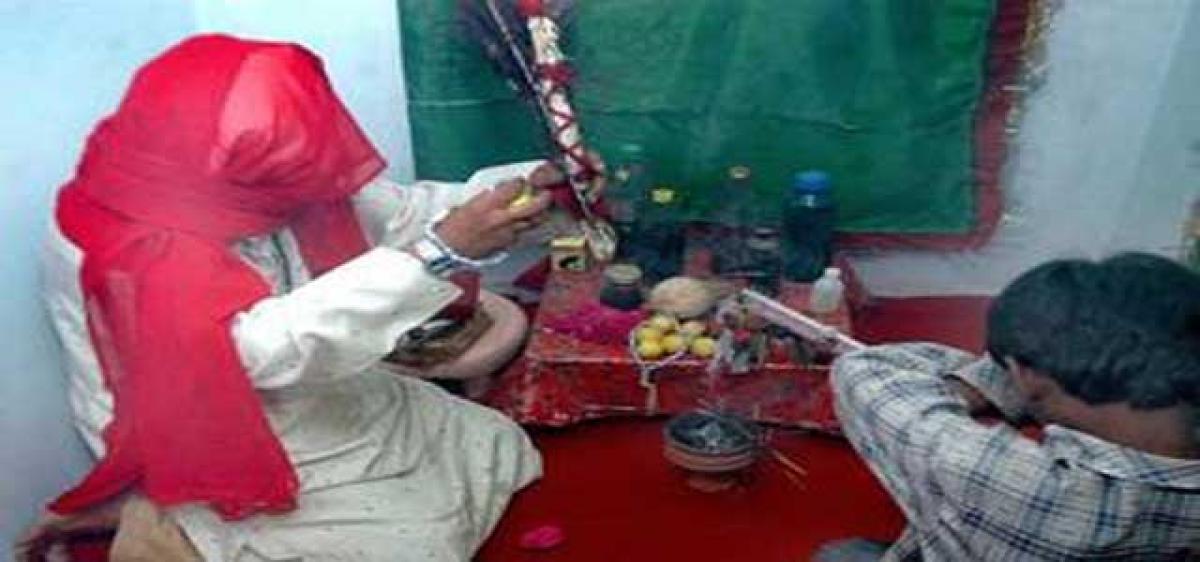Live
- Unveiling the Hidden Gems: Surprising Health Benefits of Garlic Peels
- Overcoming Sleep Struggles: A Comprehensive Guide to a Restful Night
- RTC bus hit the auto
- MLA Kuchukula Rajesh Reddy participated in the Birappa festival
- DMHO starts awareness campaign on Malaria
- World Intellectual Property Day 2024: Date, History, Significance, and Everything You Need to Know
- Shiv Sena-UBT manifesto assures dignity to all states; ‘no’ to polluting nuclear, refinery mega projects
- IPL 2024: Delhi Capitals sign Gulbadin Naib to replace injured Mitchell Marsh
- Delhi court grants 30-day extension to police to conclude probe in Parliament security breach case
- Cash, liquor, drugs valued at Rs 321 crore confiscated in Punjab
Just In

Illiteracy, lack of access to mental hospitals and scarcity of psychiatrists is driving many mentally ill people towards magical healers for treatment in the State.
Hyderabad: Illiteracy, lack of access to mental hospitals and scarcity of psychiatrists is driving many mentally ill people towards magical healers for treatment in the State.
A study done by D Aparna and G Prasad Rao’ working in a private hospital in the city, have found that as many as 36 per cent of the mentally ill are going in for magic-healers like Babas, tantrics etc who give talismans and other material claiming to cure the illness.
The study recently published by them says that despite the enormity of psychiatric morbidity, a substantial treatment gap exists between available resources and the illness burden. In a recent WHO study, nearly 76-85 per cent of seriously mentally ill patients had not received any treatment in the preceding 12 months.
Mental illnesses is understood, in India, as being intricately related to spiritual and religious factors, and this belief often influences patients’ recognition of illness and their care-seeking behaviors. As a result, traditional magical healers turn to be important source of health-care for a significant proportion of mentally ill patients.
Their therapeutic interventions for mental illnesses take several forms and include prayers, rituals, exorcism, counter magic, talismans, enchanted rings, sacred ash, and offerings to temples etc. all related to subscription to a core set of spiritual or religious beliefs about the nature of mental illnesses.
A number of factors are suggested to influence the patient’s decision to seek treatment from a magico-religious healer and they include the patient’s socio-economic status, literacy, gender, nature of symptoms, affordability and access to care, previous and vicarious experiences of care for similar problems, etc.
The study says 36.3 per cent of the subjects studied had sought care from magico-religious healers in the first instance. The rest of 63.7 per cent consulted various other healthcare providers like medical practitioners, psychiatrists, medical specialists like neurologists, community nurses and social workers.
The study evaluated the socio-demographic and illness characteristics of patients who sought magico-religious treatments in the first instance for their mental health symptoms, in comparison with those who sought alternative medical help.
Magico-religious healers constituted an important health-care contact point for patients with mental health symptoms. Their patients were less educated than patients who sought health-care from alternative sources. However, the study did not find the usefulness of magico-religious healers.
The researchers feel that training and awareness creation amongst patients as well as locally identified magico-religious healers may help to shorten the duration of untreated illness. Maintenance of a registry of locally practicing magico-religious healers, regular training and exchange of information, and active liaison with local psychiatric services may help in improving mental health care.

© 2024 Hyderabad Media House Limited/The Hans India. All rights reserved. Powered by hocalwire.com







